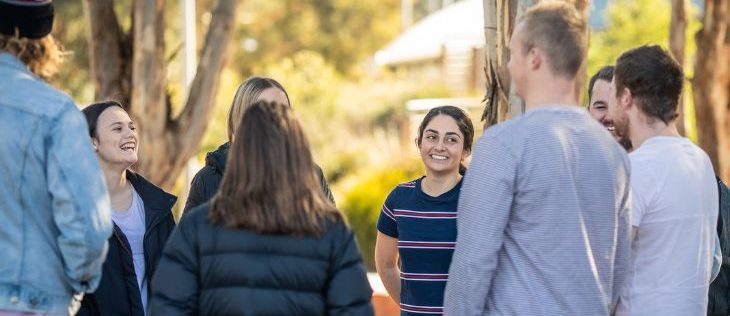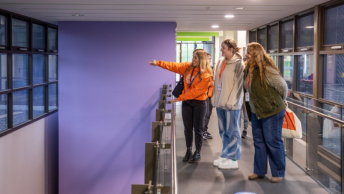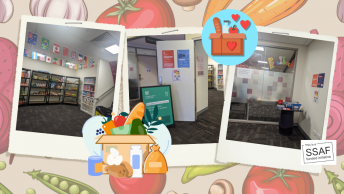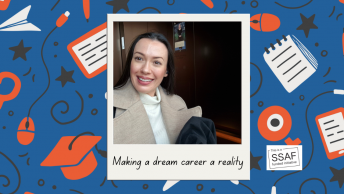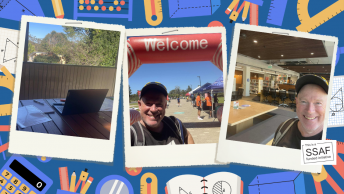Written by Anna Somers
We look forward to celebrating International Day of People with Disability tomorrow, 3 December 2022, to recognise all the incredible achievements of those who have a disability.
Anna Somers is an inspiring Charles Sturt Student who has successfully graduated from a Bachelor of Nursing and Graduate Diploma in Critical Care (paramedic) and she looks forward to studying her Masters next year. We had the pleasure of catching up with Anna to ask her about her experience studying with Autism and ADHD, and navigating study through a global pandemic.

Why did you choose to study paramedicine? I understand you are looking to study your Masters so you are clearly passionate about this? Where did this passion start for you?
I chose to study paramedicine because it seemed like a good career choice. Every person who I had met that had worked in an ambulance service was so passionate about their job. Then the more I studied and spent time in emergency services I realised that paramedicine was more suited to how I think and operate than other healthcare areas. I realised I could make a real difference to people’s lives. I’m often the first point of contact for a patient’s healthcare journey and it’s like I set a foundation for their treatment.
I’m really passionate about a lot of the non-clinical areas of the job – it’s not always an adrenaline rush and lights and sirens. I live and breathe concepts like person-centred care, patient education and advocacy, and just making sure I’m listening to the needs of the patient. This is often what the patient will remember about our visit and it makes a long-term impact. I am always very excited about the clinical aspects of my job and I think having my ‘special interest’ be in pre-hospital healthcare does help me keep my passion.
I am also aware that you were diagnosed with Autism and ADHD during the course of your studies, which was also during the pandemic. Can you detail a little about this and some of the challenges you faced regarding getting your diagnosis, the type of support you were offered and whether you felt this was more challenging also due to the impacts of the pandemic?
I really struggled to ‘figure out’ how to study and retain information during my Bachelor of Nursing, but by the start of the 3rd year I had my own system for keeping track of assignments and learning materials. This was a very intensive and difficult way of studying, but I thought everybody was struggling with study. I didn’t realise I was neurodivergent until mid-2021 when I was almost finished with my Graduate Diploma of Clinical Practice (Paramedic).
I found I could balance my time between study, full-time work, and my personal life – but it would really take a toll on me over time. Again, I just thought everybody was in the same boat, we’re all stressed and tired in this pandemic. Treatment for mental health conditions weren’t working, but there wasn’t a reason why until my GP said he thinks I might have Autism Spectrum Disorder. I was quite taken aback by this and went home and did some research and realised ‘yeah, I probably have this’.
I made an appointment to see a psychiatrist through Dokotela via Zoom, which used to be a publicly funded service. I didn’t have a lot of money at the time to try and see anybody privately and there weren’t many services available in my home town. This made a huge difference to my quality of life. I didn’t have to wait too long, maybe about 6 months – but I know it can take people years to be diagnosed. Dokotela isn’t a publicly funded service anymore as far as I’m aware, which would really impact the access people have to similar services in regional areas.
At first I didn’t know what accommodations would be suitable for me while studying. I guess I’d been doing it the hard way for so long that it was difficult to ask for help. I had some accommodations during my last session of the postgraduate degree and it made a huge difference. I found it was easier to balance my life, work and study, and the accessibility software helped me to retain course content more effectively. The accommodations, as well as medications for ADHD, really eased the burden.
What other challenges did you face during the pandemic, and in particular how did that impact on your mental health and wellbeing?
I had quite a few challenges during the pandemic. I started my graduate year of nursing just before the Delta COVID-19 outbreak. Then I found out I had ASD/ADHD, which comes with its own reality check and I had to come to terms with the fact that my life could have been easier if I was diagnosed as a child rather than at 24 years old. I’ve only just started to advocate for myself in the workplace for accommodations, so a new-graduate year of nursing in a pandemic, with constant sensory overwhelm and unmet communication and cognitive needs was challenging.
Then I started my postgraduate degree and found my true passion – pre-hospital care. While this was stressful, it gave me something to aim for and work towards. I then became sick with a significant COVID-19 infection in December 2021. I’m still recovering from this almost a year later! Then I moved to New Zealand in January 2022 for an opportunity with the ambulance service here to gain experience prior to graduating.
Since my time in New Zealand, I’ve faced more challenges than the rest of my life combined. I was in two separate domestic violence incidents, subject to a few months of emotional abuse and bullying, discrimination, experienced homelessness twice, amongst other challenges. I’m only just starting to find some stability now after about a year of non-stop hardship.
What avenues did you use to help support you through these challenges?
I’m lucky to have gained as much resilience over the years as I have! I’m well equipped with using coping mechanisms and reaching out for help when times are tough now. I made sure to keep in contact with friends and family.
I was able to keep contact with a mental health support service from Australia until I found adequate supports here in New Zealand. Sadly, healthcare services here in New Zealand are vastly underfunded and access is limited, especially for mental health services. I was able to use an EAP service here to see a counsellor to discuss workplace accommodations for my ASD/ADHD. I was linked in with a psychologist at one point, but the funding for sessions ran out. When I moved to a different area of the country, there weren’t any mental health services locally that could provide any funded sessions for someone with Autism to have preventative mental health services.
If I need to, I know that Lifeline and the text-line services are there. I struggle to make friends normally, but I have a few mates here. There’s also Charles Sturt advisors who’ve provided accommodations and I think that there are services for mental health through them too.
Where did you first find out about Charles Sturts Accessibility and Inclusion Support?
I found out about the Accessibility and Inclusion Advisors at the end of my first year of nursing study. I thought I just had anxiety at the time, particularly for the seated exams. With the Accessibility and Inclusion Support I was able to sit in a room by myself and this made exam season a lot easier.
The Accessibility and Inclusion Advisors kept in contact with me through my degree and they made sure that the transition between degrees was smooth. They offered a lot of insight and help when I was diagnosed with ASD/ADHD.
You had assistance and support from the Accessibility and Inclusion Advisors and a Study Access Plan. What adjustments did you receive and what difference did it make?
Before the pandemic, I was able to sit on my own in a room for exams rather than in the big hall. I think I was also able to take a breather in the exam if I felt too overwhelmed.
After my diagnosis, I had additional time in exams – this helped me process the information. I was allowed to speak to myself, use fidget items, and stand up and stretch if I needed to. I also had access to text-to-speech software and digital resources which helped me to study in a more efficient way. Having a Study Access Plan also helped me to advocate for myself to my lecturers if I needed assistance or an extension. While I didn’t always need to use the plan for every assessment or exam, it was good to have it there just in case.
You also had some great support and experiences from your academics and teachers. Are you able to speak a little about this?
My lecturers were always very understanding of my needs and happy to work with me. I always have a lot of questions about course content, but I like to think it’s good to show interest! My lecturers in my final session were wonderful. This is when I had my accommodations, but I was also in a very challenging transition to New Zealand and homeless at the time. I didn’t want to be too much of a burden, but it was great to feel supported by the university.
Tell us about the impacts of COVID-19 on studying. Was it easier or harder to study over the time that COVID-19 hit the world?
I really like studying via distance. I get very distracted in classroom settings or in lecture halls so being able to have a space where I can just learn at home was great. The pandemic didn’t really affect that too much, if anything distance study was made a lot easier because everyone was doing it. I was still able to go on clinical placements and I would voluntarily drop in to my local campus to do simulation days. Of course, I would have felt a lot less prepared for employment if I couldn’t do the simulation days, residential school or the clinical placement so I’m glad the timing worked out!
You have been successful. What can you say that will motivate other students who have health issues or barriers to keep on going? What strategies/tips/advice can you offer?
Resilience is not ‘not being affected’ by challenges in life. Resilience is accepting the challenge, letting yourself feel whatever emotion you have but not letting it control you, and then choosing how to respond to the challenge. We get to create who we are through our choices in life – sometimes that choice is picking yourself up after adversity. Take it day-by-day, or moment-by-moment, and before you know it, you look back and realise how much you’ve grown.
It also helps to realise you’re autistic and have ADHD and have the right treatment. I spent years thinking I was nuts, but it turns out my brain just worked differently. My other piece of advice is to have compassion for yourself and meet your own needs, sensory or otherwise.
What particular strategies did you use during the pandemic to help you through?
Radical acceptance of whatever is happening will always be a favourite – ‘It is what it is’. I change what I can, but I accept what I can’t.
Staying connected to a support network. You don’t have to suffer alone, but make sure to not overwhelm people. It’s hard to find a nice balance of reaching out for help, while not fatiguing the person you’re leaning on. Have a few different people to go to, and try and have at least one mental health professional in there somewhere!
Finally, exercise! Trying to exercise everyday has really helped with my ADHD and it lets me blow off stress. Even just going for a walk every other day is a huge benefit.
What does life look like for you now that you have finished your degree and what are you looking forward to next?
I’m currently working as a patient transfer nurse/paramedic in New Zealand. This has been a really cool opportunity for me to use my paramedic skills and make a difference to people’s lives. I’ve applied for graduate paramedic roles in emergency ambulance services in New Zealand, Australia and London. Fingers crossed!
I started my Masters in Paramedicine (Critical Care) next year. I’ve chosen to do this part-time to allow myself to gain adequate experience as a paramedic before progressing to a higher clinical scope. I almost dropped out of high school, and to think I’m about to start a Masters degree astounds me.
I’m also hoping to write some more journal articles for paramedic journals over the next few years – I’ve already had one peer-reviewed paper published and I’m keen to add more! I want to make a positive difference to the healthcare system and I think getting involved in research and academic writing will be a great way to achieve that.


